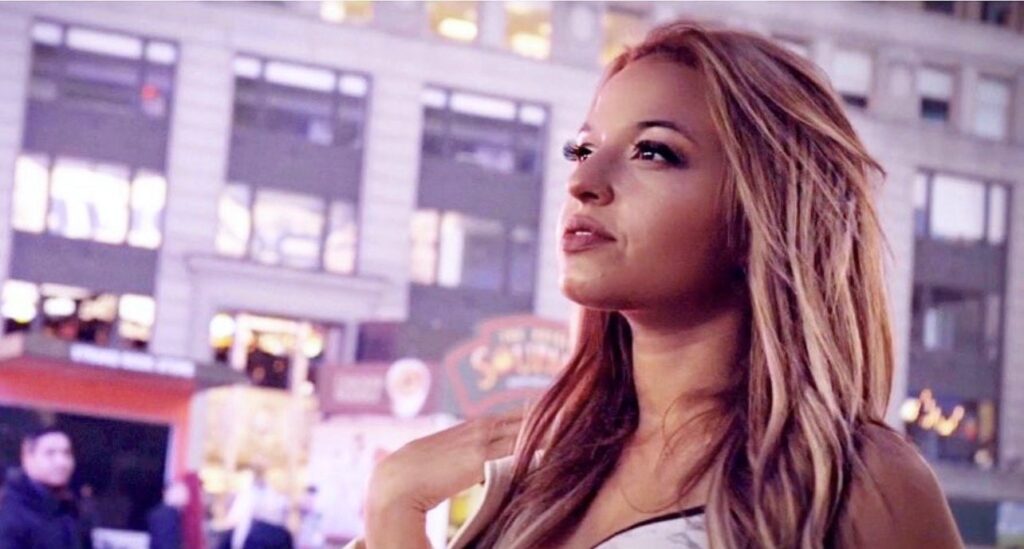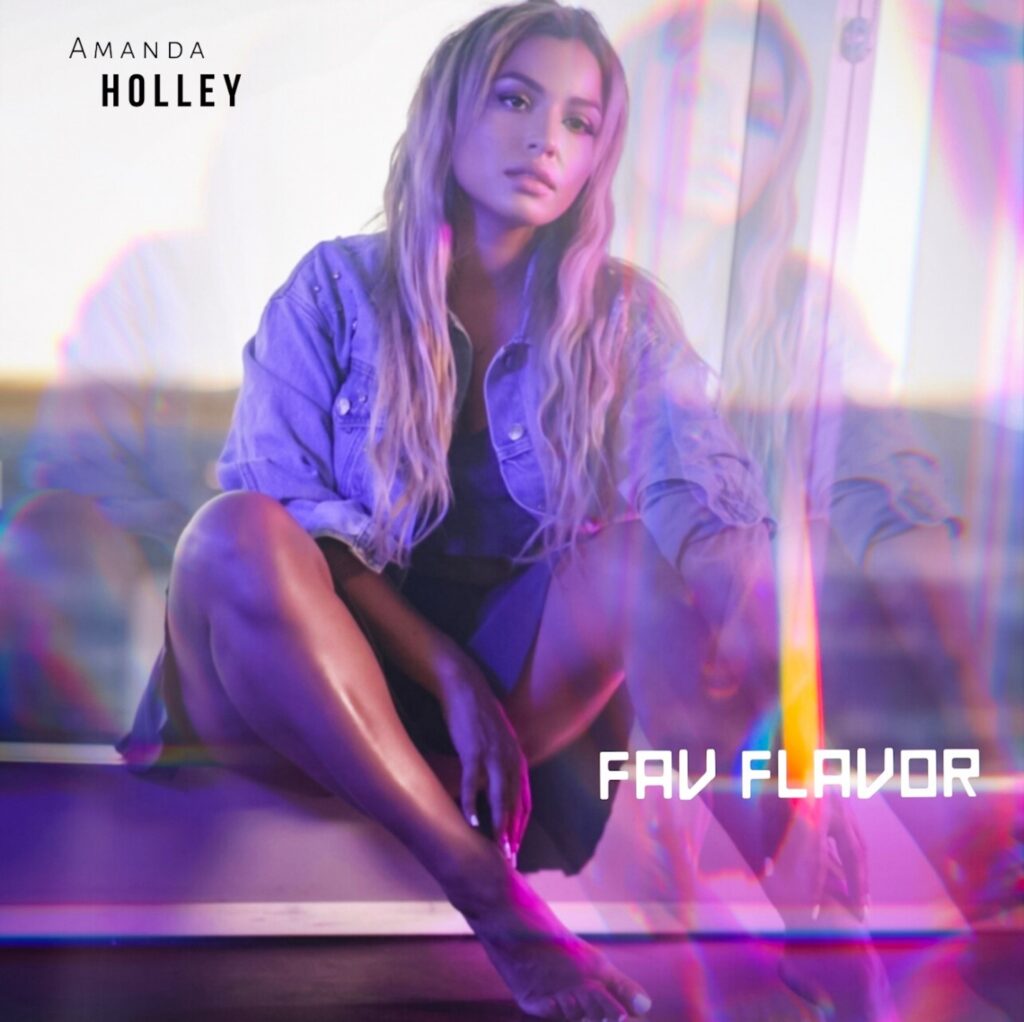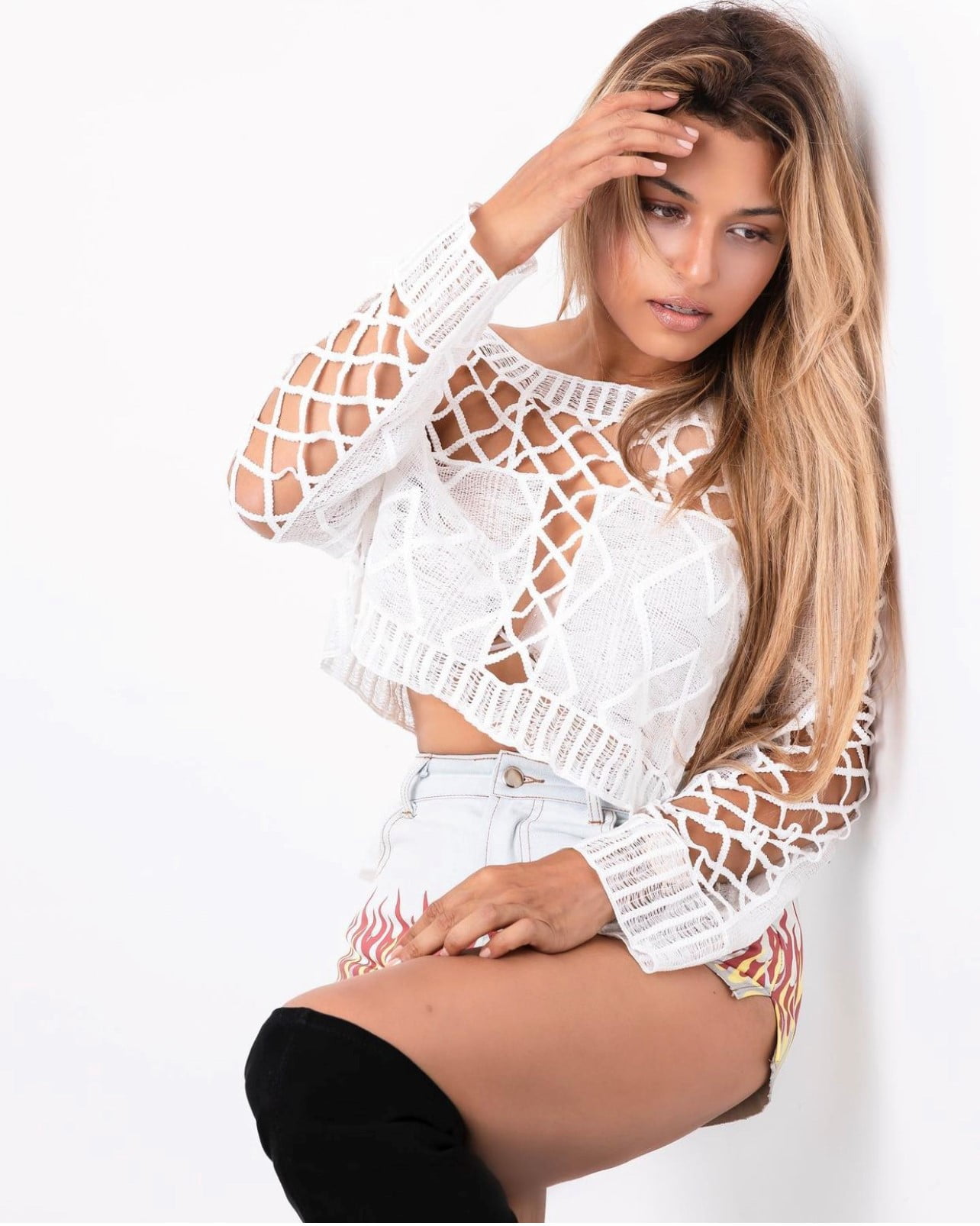Amanda was born to make music. Before she could speak, this bi-racial, native Newarker, deeply soulful, five-octave songstress sang. Holley was born into music and has overcome adversity by surviving on her vocals since the day she was born. She was immersed in rhythm and melodies from birth thanks to her cellist mother and her guitar-strumming, songwriting father (a writer for Sarah Vaughan). She has been performing for large crowds since the age of seven and is also a self-taught pianist (since age 2) and violinist. Since the release of her album Tommy Boy by Warner Bros., Amanda has recently performed her music at a number of prestigious locations, including CARNEGIE HALL, BIRDLAND, UNITED NATIONS, NYFW, opening for WALE at SONY HALL, COACHELLA events, W TIMES Sq., and Hollywood, among many other small and large hotspots across the U.S. She played the TITLE Track in the SHOWTIME movie “Sharon 1 2 3.”
Her collaborations with Billboard Charting producers/songwriters Davis Chris, Shane Foster, and Cecily Wagner on the singles “CODE” and “Runaway” from her upcoming EP, “The HolleyGraphic EP,” launched Holley’s empowering message.
Millenials/Gen Z With songs in her discography that are hard-hitting yet smooth electronic Pop/R&B productions, Amanda displays her five-octave range and sultry powerhouse vocals. This is just a taste of the extremely talented, multi-instrumentalist, singer/songwriter Amanda Holley. Her arsenal of records is ready to go, thanks to her collaborations with Grammy & Oscar winning & up & coming hot producers alike. Check out her latest single Fav Flavor and the exclusive interview below:

1. Can you tell us a bit about where you come from and how you got started?
AMANDA HOLLEY: I’m originally from Newark, NJ. For me, it feels like I never “got started” with music, because music is the reason for my existence and has been with me and in me since I was born. Music has never really been something that I make or do. rather, music is all that I am and the way my life has unfolded and developed is just the natural progression of my purpose on Earth. My family tells me I sang before I spoke. maybe it was because my mom was a concert cellist and played her instrument and sang for hours while I was in the womb or maybe because she would have me come with her to work in the theater orchestra pits (most nights we couldn’t afford babysitters) while she played for various musicals. or maybe something inside of me absorbed the music from my dad and his family. The urge to perpetually sing and play could have come from the faint memory of my father’s guitar strumming & singing with my mom when I was an infant when he was briefly in my life – before I can remember. I don’t really know the how or the why. it’s just the way it’s always been for me on this planet.
2. Did you have any formal training or are you self-taught?
AMANDA HOLLEY: Growing up, me and my mom didn’t have much in terms of money. but we had music. Looking back, I feel like maybe it was a blessing in disguise to have to rely on my ears rather than have formal training in early childhood. I picked up my first violin at age 2. which mom was able to give me some guidance on as she went to one of the top music schools in the world, Manhattan School Of Music, but she wanted me to find my own way as a musician. I began writing songs at age 3 – which I think I got from my estranged father (my dad, Gregory Clarke Holley wrote songs for Sarah Vaughan). I would hear what I called “angel voices” and then turn to the keyboard and try and sing and play out the chords and melodies in my mind by mimicking what I saw the musicians around me doing. The theater directors my mom worked for heard me singing along in the orchestra pit and soon got involved and started integrating me into state theater programs. My aunts and uncles and people at church would always ask me to sing for them and I really just assumed that that’s what I’m here to do because it makes people happy and helped me express so many emotions going through a troubled childhood. We moved around a lot when I was little and at one of the schools, the music teacher happened to be an amazing jazz pianist and composer (Bob McHugh). He heard my voice and started putting me on stage and people took notice. Before you know it, I was performing for hundreds and soon thousands. Soon after, I officially met my dad and his sister, Pat Holley. Aunt Pat just so happened to go to Juilliard, wrote for and co-managed Stephanie Mills, sang with Oscar Peterson, and toured the world as an arranger. The day I met her at her Upper West Side NYC apartment, I sang for her and soon she had me singing for her friends. One was the director of the Juilliard Prep program and another was the Musical Director for the O’Jays for 30+ years (Dennis Doc Williams – who later became my musical director). out of love and support, they soon surrounded me with great musicians and teachers and artists. I took advantage of every ounce of their kindness to learn as much as I could and am so very thankful.
3. Who were your first and strongest musical influences and why the name ‘AMANDA HOLLEY’?
AMANDA HOLLEY: My first and strongest influences were absolutely the original female R&B, Soul, & Jazz singers like Billie Holiday, Whitney Houston, Aretha Franklin, Ella Fitzgerald, Mariah Carey etc. I was also inspired by and looked up to Alliyah, Beyonce, Christina Aguilera, Alicia Keys, etc. I was constantly craving powerful vocal performances and lyrics and melodies as a kid to get through dark times. I survived on their music. Being that my dad wasn’t in my life, it was hard for me to conceive of using his last name, “Holley”, as my stage name. but the love of his family and how they welcomed me once they found me for the first time as a kid and took me under their wings really inspired me so much. That and our family history – the Holley family has a history as African Americans and artists. My dad’s family were a freed slave family from the south and my great grandmother was Cherokee and survived the Trail of Tears. Everyone in our family had the gift of music and art and did amazing things in music from my Dad and my Aunt to my Uncles. I was in awe of my ancestors & so so proud of what our family has overcome & achieved that I decided to use our family name as my stage name in honor of them and it’s special because I feel my ancestors in everything I do.
4. What do you feel are the key elements in your music that should resonate with listeners, and how would you personally describe your sound?
AMANDA HOLLEY: In the most literal sense, I’m a pop / r&b / soul singer, musician, and songwriter. Aside from the music, I feel that the deepest elements of my artistry stem from the painful, traumatic, and challenging times I survived throughout my childhood and teen years that spiraled into me getting into very dark, life threatening situations as a female on a personal level and within the industry that mirrored the abuses I endured growing up. These past few years are the first abuse free years of my life. but through it all, music saved me. propelled me forward, literally sustained me and kept me alive on every level. It was my miracle and a gift from the Creator. My voice was the one thing I could truly trust, the pages of notebooks where I would pen my lyrics was my sanctuary, and being on those stages with the audience was home and the safest and freest place in the world. Music was more than a collection of sounds. it’s everything. Because of this, I’ve always just surrendered to the song and the messages, feelings, and emotions I’m here to deliver as an artist. and being as emotional as I am, there is an element of soul in every performance I deliver. only because I can’t help it and holding back or conforming to societal norms just wouldn’t be fair to those who are craving music the way that I do. I also engrossed myself in classic lit as a kid – yea I was kinda strange. because of my love for writing, I was published by Columbia Press for Poetry and Prose as a teen. though I modify my style for my song lyrics, every now and then I think you can feel my poetic voice for sure.

AMANDA HOLLEY:
Like most artists, I would aspire to perform my favorite songs like the original artists who sang them. it was my Aunt who began to demand that I use sheet music prior to listening to any performance of a new song and teach the melody and lyrics to myself. Her doing that – I feel is what really forced me to know myself as a vocalist. As things progressed, I eventually ended up having 80 time Grammy nominated producer Phil Ramone as my manager before he passed and, one after another, great producers and writers would take me on and help me to dig deeper, go beyond what the business has asked of me, pushed me to surprise myself. For me, this has always been about the art and my connection to people and I have so much to learn about my instrument and my sound . but I feel that, by being an open vessel to something bigger than I am, I can channel vibrations that may not have been explored before. I’m a very passionate person and am just beginning to realize that I’m more powerful than I thought I was. I’m finally learning to assert myself as a person, a female, and as an artist and I know that I will grow more and more each day. New songs I compose and co-write or even just perform always cause a shift within me as a person and help me navigate life in a crazy world . and it’s my wish that that’s what my music will do for my listeners.
6. What’s your view on the role and function of music as political, cultural, spiritual, and/or social vehicles – and do you try and affront any of these themes in your work, or are you purely interested in music as an expression of technical artistry, personal narrative and entertainment?
AMANDA HOLLEY:
Art is the most powerful medium in the world to bring about culture political change, spiritual connection and elevation, and social shifts and awareness. Music is a force for growth, release, and transmutation and it literally effects us on a molecular level. I believe that’s why we artists exist . to channel these frequencies and help us all connect to – and elevate one another in ways that no other methods can. I’m an extremely passionate person and, for me, the song is never trivial . even if I’m writing / performing a trap record, there’s always some message at the core of it . only because I have to feel what I sing. Because I’m a survivor since I was born, I feel it’s my purpose to stand for what’s true and raw and real. Maybe it’s selfish, but by creating music and performing with every ounce of my being helps me feel like the stuff I’ve overcome was not in vain. Maybe I can be there for someone the way that my favorite singers were there for me.
7. Do you feel that your music is giving you back just as much fulfillment as the amount of work you are putting into it, or are you expecting something more, or different in the future?
AMANDA HOLLEY:
As a child, I believed that “when I grow up, I’ll be a singer and everything will be perfect”. That’s how I got through most nights. My journey in the industry has been anything but perfect . it’s a roller coaster full of highs and lows, miracles and horror . pain and beauty. The way I see it, so many true artists always either give up or give in to what is asked of us because we think we have to in order to live our dream . for me, this dream won’t be fully realized unless I get to the top as the soul that I am. Every millisecond on stage with the live audiences, the moments when a song writes and sings itself through me . those moments give me the highest, freest feeling in the world and are so much more than I ever imagined I could have and I’m so excited for the future.
8. Could you describe your creative processes? How do usually start, and go about shaping ideas into a completed song? Do you usually start with a tune, a beat, or a narrative in your head? And do you collaborate with others in this process?
AMANDA HOLLEY:
The creative process for me really is a process of just being open and allowing the song to happen. I hear music all around me and see the music in colors and pictures . this goes on most of the day and night for me . even when I’m sleeping. It’s so constant that I have to tune it out in order to just function throughout the day. I truly believe the music is all around us whether we physically hear it or not and it really feels like the songs write themselves. I love collaborating with others as well as composing on my own . each song has its own life each with a different purpose in this world . I feel that we as artists are here to connect the frequencies around us with others who need to feel and hear them. If I had to give advice to a composer starting out, I would say just grab your instrument, your voice, your keyboard, your guitar . just just play / sing and see what flows. Sometimes it’s the melody and the lyric at the same time, sometimes just lyrics or just the melody or the chords or the beat.
9. What has been the most difficult thing you’ve had to endure in your life or music career so far?
AMANDA HOLLEY: I’ve gone through so much in my short time in this world . have survived so much and it’s been an uphill battle since birth physically, emotionally, as a female, as a black female, and as an artist . I love people through it all – even with everything I’ve lived through and all the darkness I’ve seen . Poverty? Homelessness? Extreme racism within my own family and industry? SA and Abuse in all its forms? . I can deal with all of it. I’ve survived so much and now I know I’m strong enough to get through anything and everything and be a voice for others. I’ve survived situations where I easily should have and could have died. The light in the dark was always music. I became so angry and disillusioned when these same circumstances occurred in my industry and my music was the carrot that was dangled. Navigating dangerous situations and people with my music at the center of it all . That’s been the most difficult, heartbreaking thing – I never relied on anything but music . and now I would have to navigate and survive just to exist as an artist. I cried it out, then soldiered on so I can be one of the artists that helps shift the environment of the industry for next ones.
10. On the contrary, what would you consider a successful, proud or significant point in your life or music career so far? AMANDA HOLLEY: I’ve had so many proud and surreal moments that make all the craziness and chaos worth it for me . One of those key moments was getting to play and sing my original song I wrote at Carnegie Hall at a charitable event produced by Michel Pascal (co-writer with the Dalai Lama), with musical director for Earth, Wind, & Fire, Myron McKinley. I had a Steinway & Sons Piano in my dressing room. Some of the best musicians in the world never get the opportunity to have a moment like it . I dreamed about that moment ever since I was a little girl! Working with Grammy & Oscar winning producers and arrangers, singing for the Kings of Africa at the United Nations and them singing along with me, playing major stages all over the country . it’s all overwhelmingly beautiful . maybe the most significant moments are when someone cries at a show and tells me that my song did something for them. That is what I live for more than anything!
KEEP IN TOUCH:
INSTAGRAM | SPOTIFY | WEBSITE | YOUTUBE

Photo credits: LOUIE GOOEY
